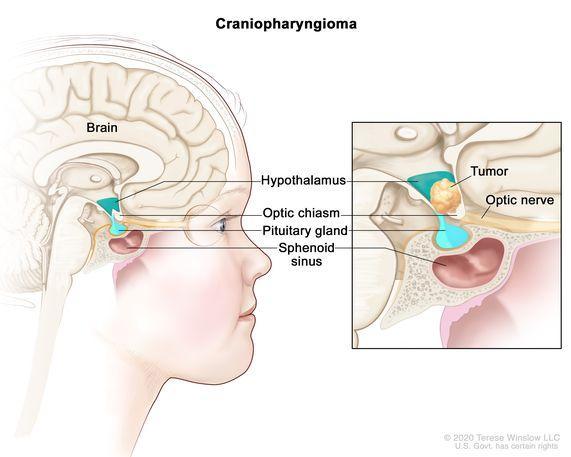CRANIOPHAYNGIOMA
What is Craniopharyngioma?
Craniopharyngioma is a rare, virtually benign type of brain tumor that affects the central nervous system (CNS). Craniopharyngioma can be treated by neurosurgery, neuro-ophthalmology, neurology, endocrinology, and pediatrics. Although the tumor is noncancerous the treatment is challenging as it can adhere to the surfaces that surround it.
Craniopharyngioma generally begins to form near the brain’s pituitary gland which is called the “master gland” of the body and specifically in the sphenoid bone. Approximately 10 to 15 percent of pituitary tumors are craniopharyngiomas.
Craniopharyngioma does not spread to other parts of the brain or body. They can grow however it grows slowly. As the craniopharyngioma tumor grows it can press on nearby parts of the brain where the secretes hormones that control the body functions takes place, including the pituitary gland, optic chiasm, and optic nerve.
Craniopharyngiomas can occur at any age including adults over age 50 but generally occurs among children and young adults.
What are the Symptoms of Craniopharyngioma?
Craniopharyngiomas are benign tumors that are mostly found in children between the ages of 5 and 14. Six percent of all brain tumors in children are diagnosed as Craniopharyngiomas.
The very first sign of craniopharyngiomas in children is growth retardation. The children with craniopharyngioma may grow slowly or may be smaller than expected.n
Other symptoms of Craniopharyngiomas are;
- Balance problems
- Confusion, mood swings, or behavior changes
- Headache
- Increased thirst and urination
- Nausea and vomiting
- Vision problems
Treatments for Craniopharyngioma in Turkey (Türkiye)
The treatment for craniopharyngiomas in Turkey will be planned according to the individual’s age, underlying medical comorbidities, tumor location, type, and invasiveness. Generally, a neurosurgeon and endocrinologist work together to develop the optimal treatment plan. Surgery and radiotherapy are the most common modalities used for the treatment of craniopharyngiomas in Turkey.
Craniopharyngiomas are generally treated with brain surgery. There are two types of surgical approaches one is endoscopic endonasal transsphenoidal (EET) or transcranial, and the other is craniotomy. The goal of surgery is to remove as much of the tumor as possible. After the surgery, to manage the hormonal deficiency hormone replacement therapy and/or stereotactic radiosurgery may be recommended.
Radiation treatment will be planned to prevent recurrences. Radiotherapy aims to decrease tumor burdens without giving harm to neural structures.
For further information and treatment please contact…

